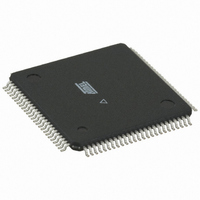ATMEGA6450-16AI Atmel, ATMEGA6450-16AI Datasheet - Page 13

ATMEGA6450-16AI
Manufacturer Part Number
ATMEGA6450-16AI
Description
IC AVR MCU FLASH 64K 5V 100TQFP
Manufacturer
Atmel
Series
AVR® ATmegar
Datasheet
1.ATMEGA325-16MU.pdf
(362 pages)
Specifications of ATMEGA6450-16AI
Core Processor
AVR
Core Size
8-Bit
Speed
16MHz
Connectivity
SPI, UART/USART, USI
Peripherals
Brown-out Detect/Reset, POR, PWM, WDT
Number Of I /o
68
Program Memory Size
64KB (32K x 16)
Program Memory Type
FLASH
Eeprom Size
2K x 8
Ram Size
4K x 8
Voltage - Supply (vcc/vdd)
2.7 V ~ 5.5 V
Data Converters
A/D 8x10b
Oscillator Type
Internal
Operating Temperature
-40°C ~ 85°C
Package / Case
100-TQFP, 100-VQFP
For Use With
ATSTK600-TQFP100 - STK600 SOCKET/ADAPTER 100-TQFPATSTK504 - STARTER KIT AVR EXP MOD 100P LCD
Lead Free Status / RoHS Status
Contains lead / RoHS non-compliant
Available stocks
Company
Part Number
Manufacturer
Quantity
Price
- Current page: 13 of 362
- Download datasheet (7Mb)
6.5
6.5.1
2570M–AVR–04/11
General Purpose Register File
The X-register, Y-register, and Z-register
• Bit 0 – C: Carry Flag
The Carry Flag C indicates a carry in an arithmetic or logic operation. See the “Instruction Set
Description” for detailed information.
The Register File is optimized for the AVR Enhanced RISC instruction set. In order to achieve
the required performance and flexibility, the following input/output schemes are supported by the
Register File:
•
•
•
•
Figure 6-2 on page 13
CPU.
Figure 6-2.
Most of the instructions operating on the Register File have direct access to all registers, and
most of them are single cycle instructions.
As shown in
mapping them directly into the first 32 locations of the user Data Space. Although not being
physically implemented as SRAM locations, this memory organization provides great flexibility in
access of the registers, as the X-, Y- and Z-pointer registers can be set to index any register in
the file.
The registers R26..R31 have some added functions to their general purpose usage. These reg-
isters are 16-bit address pointers for indirect addressing of the data space. The three indirect
address registers X, Y, and Z are defined as described in
One 8-bit output operand and one 8-bit result input
Two 8-bit output operands and one 8-bit result input
Two 8-bit output operands and one 16-bit result input
One 16-bit output operand and one 16-bit result input
Registers
Purpose
Working
General
Figure 6-2 on page
AVR CPU General Purpose Working Registers
shows the structure of the 32 general purpose working registers in the
7
13, each register is also assigned a data memory address,
R13
R14
R15
R16
R17
R26
R27
R28
R29
R30
R31
R0
R1
R2
…
…
ATmega325/3250/645/6450
0
Addr.
0x0D
0x0E
0x0F
0x1A
0x1B
0x1C
0x1D
0x1E
0x1F
0x00
0x01
0x02
0x10
0x11
Figure 6-3 on page
X-register High Byte
Y-register High Byte
Z-register High Byte
X-register Low Byte
Y-register Low Byte
Z-register Low Byte
14.
13
Related parts for ATMEGA6450-16AI
Image
Part Number
Description
Manufacturer
Datasheet
Request
R

Part Number:
Description:
Manufacturer:
Atmel Corporation
Datasheet:

Part Number:
Description:
IC AVR MCU FLASH 64K 64TQFP
Manufacturer:
Atmel
Datasheet:

Part Number:
Description:
IC AVR MCU FLASH 64K 5V 64TQFP
Manufacturer:
Atmel
Datasheet:

Part Number:
Description:
IC AVR MCU FLASH 64K 64-QFN
Manufacturer:
Atmel
Datasheet:

Part Number:
Description:
MCU AVR 64KB FLASH 16MHZ 64TQFP
Manufacturer:
Atmel
Datasheet:

Part Number:
Description:
MCU AVR 64KB FLASH 16MHZ 64QFN
Manufacturer:
Atmel
Datasheet:

Part Number:
Description:
IC AVR MCU FLASH 64K 5V 64QFN
Manufacturer:
Atmel
Datasheet:

Part Number:
Description:
Manufacturer:
Atmel Corporation
Datasheet:

Part Number:
Description:
Manufacturer:
ATMEL Corporation
Datasheet:

Part Number:
Description:
Manufacturer:
ATMEL Corporation
Datasheet:

Part Number:
Description:
IC AVR MCU 64K 16MHZ 5V 64TQFP
Manufacturer:
Atmel
Datasheet:

Part Number:
Description:
IC AVR MCU 64K 16MHZ 5V 64-QFN
Manufacturer:
Atmel
Datasheet:

Part Number:
Description:
IC AVR MCU 64K 16MHZ COM 64-TQFP
Manufacturer:
Atmel
Datasheet:

Part Number:
Description:
IC AVR MCU 64K 16MHZ IND 64-TQFP
Manufacturer:
Atmel
Datasheet:











